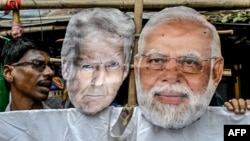US President Donald Trump has made good on his threat to impose a 50 percent tariff on nearly all Indian goods over New Delhi's purchases of Russian oil.
The August 27 announcement leaves Indian exporters facing one of the largest tariff rates in the world. That move risks rupturing the United States' strategic relationship with India, which is one of Washington's strongest partners in the Indo-Pacific and where two-thirds of the largest US corporations have offshore operations.
The White House has argued that the purchases are indirectly funding Russia's war against Ukraine. High-ranking Indian officials, meanwhile, say they have been unjustly singled out for their trade relationship with Russia and that the pressure could force them to work more closely with Beijing and Moscow.
India is the largest buyer of Russian seaborne crude and has shifted between first and second position alongside China as the top buyers of Russian oil since Moscow's full-scale invasion of Ukraine in February 2022.
The 50 percent rate, half of which is punishment for India's buying of Russian oil, is also expected to damage the Indian economy, which has the United States as its largest trading partner and has become a growing hub for US tech companies relocating their manufacturing from China.
New Delhi Holds Firm Against US Tariff Pressure
In India, the mood has been defiant as tariff pressure from Washington has ramped up this summer following an initial 25 percent tariff announced in late July over trade ties.
Since then, the country's government has refused to halt purchases of Russian oil and Prime Minister Narendra Modi urged Indians to buy local.
"All of us should follow the mantra of buying only ‘Made in India' goods," Modi said on August 26, encouraging shopkeepers to display big signs promoting domestic products. "Pressure on us may increase [from the tariffs], but we will bear it."
Indian External Affairs Minister S Jaishankar said earlier this month that Washington's demand to stop buying Russian crude is "unjustified and unreasonable" and accused the West of hypocrisy, noting Europe trades far more with Russia than India.
The imports have allowed the Indian government to provide energy at affordable rates to its 1.4 billion citizens and discounted Russian oil imports have allowed New Delhi to diversify from more expensive Middle Eastern grades.
Indian officials have noted there is no blanket prohibition on the purchase of Russian oil if the deals meet the parameters of Western sanctions.
But Washington has targeted New Delhi for its purchases throughout the war in Ukraine.
US Treasury Secretary Scott Bessent said India was profiteering from its sharply increased Russian imports, which made up 42 percent of total oil purchases, versus less than 1 percent before the war.
While officials have pushed back in their comments, Indian oil companies may be preparing to reduce their Russian imports.
Bloomberg reportedon August 26 that state-owned and private refiners, including the Indian energy giant Reliance Industries, plan to trim daily purchases to 1.4-1.6 million barrels from the current level of 1.8 million barrels.
Modi Prepares To Meet Xi And Putin In China
In the face of US pressure, New Delhi has leaned on Moscow, which it calls an "all-weather friend." Russia and India have a storied political and military relationship going back to the Cold War.
Jaishankar traveled to Moscow this month to meet Russian President Vladimir Putin, who is expected to visit New Delhi later this year.
Modi is also set to make his first trip to China in seven years to attend the Shanghai Cooperation Organization (SCO) summit on August 31 to September 1.
The visit comes as Beijing and New Delhi have sought to repair strained ties following deadly border clashes between the two countries in the Himalayas in 2020.
Modi is expected to meet with both Putin and Xi at the SCO summit, and the Russian Embassy in New Delhi has even floated the prospect of a trilateral meeting between the leaders on the sidelines.
While Trump has accused India of indirectly funding Russia's war against Ukraine through its purchases of Russian oil, he has not taken similar action against China -- another major purchaser who has enabled Moscow's war effort with diplomatic backing and the flow of militarily useful dual-use goods.













